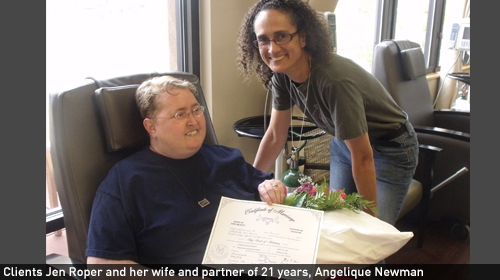
Earlier this week, the New Mexico Supreme Court heard oral arguments in a lawsuit brought by the └¤░─├┼┐¬¢▒¢ß╣¹ and the National Center for Lesbian Rights on behalf of six same-sex couples seeking the freedom to marry. I've been doing advocacy around marriage for well over a decade, and for me the arguments highlighted in several ways just how far the country has come on the marriage issue over that time.
Government officials increasingly are on our side. Back in 2004, the └¤░─├┼┐¬¢▒¢ß╣¹ filed lawsuits seeking the freedom to marry for gay couples in New York, Connecticut, Maryland, Oregon, California, and Washington state (some of those with partner organizations). In every one, a state Attorney General (almost all of them Democrats) defended the constitutionality of the state marriage laws, with most of them making profoundly anti-gay arguments, including the spurious assertion that marriage should be limited to straight people because kids raised by gay people don't do well. More recently, state Attorneys General and/or Governors have refused to defend the constitutionality of state marriage bans and have instead filed briefs on our side. That has been true in Illinois, Hawaii, Pennsylvania, California (after Prop 8), as well as in New Mexico. Indeed, a NM Assistant Attorney General stood up in court this week and gave an impassioned plea for equality and dignity for same-sex couples. And the United States Department of Justice supported the freedom-to-marry position both in United States v. Windsor and in the Prop 8 case earlier this year before the US Supreme Court. These government officials' positions reflect the change in America's attitudes towards LGBT people and marriage over the past decade. What's more, they are bringing the power of their offices to the cause of LGBT equality.
Courts are less willing to accept fanciful justifications for anti-gay discrimination. We lost many of the marriage cases that we filed in 2004, with most of those courts accepting the argument that it makes sense to limit marriage to heterosexual couples because they can procreate "by accident," and need an incentive to do so within marriage, whereas same-sex couples will always plan their children, and therefore don't need marriage. Huh?? Yes, I know, it's a silly argument, but it succeeded over and over again in the mid 2000s. So it was thrilling to hear a NM Supreme Court Justice ask one of our opponents last Wednesday just how it is that excluding same-sex couples from marriage induces even one heterosexual couple to get married or to have kids within marriage. Lawyers defending the ban on marriage for gay couples simply couldn't explain that connection. We've been making just that argument for years, but now courts are more open to hearing it.
The human toll of marriage discrimination is resonating more broadly. From their comments at argument, it was clear the NM Supreme Court justices understood that same-sex couples all across New Mexico need certainty about whether their marriages are valid. The justices were clearly moved by the fact that we had to negotiate with the state to ensure that, if our client Jen Roper dies from terminal brain cancer before this case is over, her wife and partner of 21 years, Angelique Newman, would be listed as her surviving spouse on the death certificate. Both justices and ordinary citizens alike are increasingly seeing and appreciating the devastating consequences of marriage discrimination.
With a solid majority of Americans in favor of the freedom to marry, all branches of government ÔÇô the courts, the executive branches, and state legislatures ÔÇô are increasingly on the side of equality. That took a lot of work over several decades, but boy is it wonderful to experience the change. And it's why we're going to win the freedom to marry nationwide in the not-too-distant future.
Learn more about the freedom to marry and other civil liberty issues: Sign up for breaking news alerts, , and .

